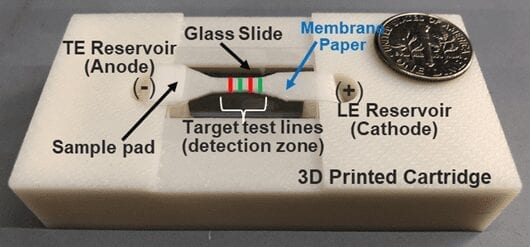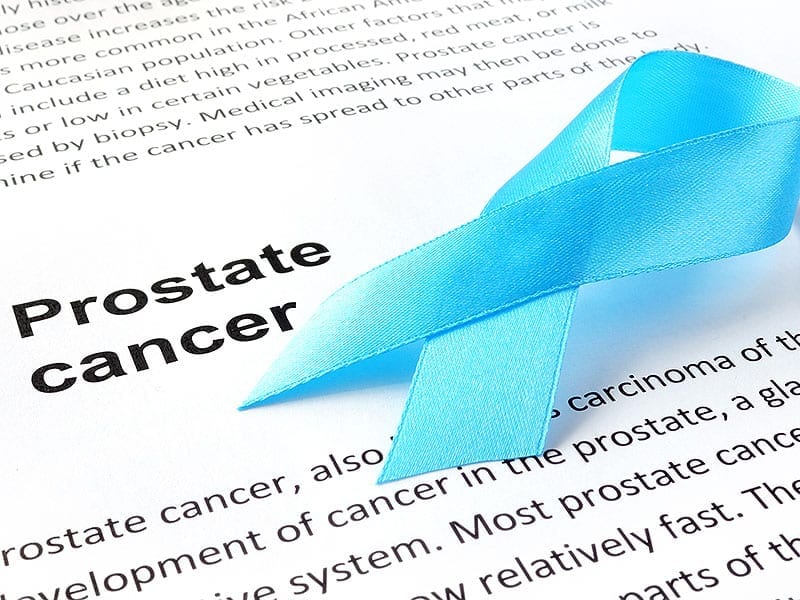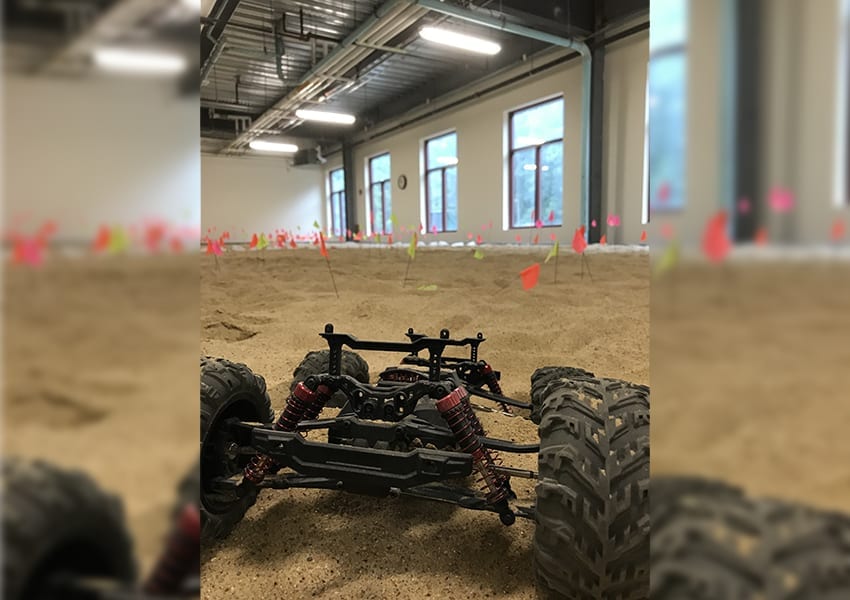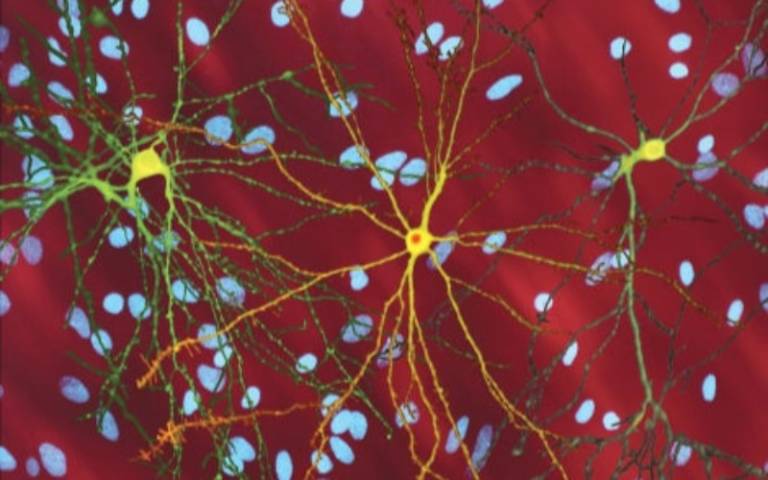
Image of the paper-based isotachophoresis (ITP) device that isolates, enriches, and detects exosomes from a prostate cancer cell line.
Washington State University researchers have developed a technology that is more than 30 times more sensitive than current lab-based tests in finding early stage cancer biomarkers in blood.
The technology uses an electric field to concentrate and separate cancer biomarkers onto a paper strip. It could someday become a kind of liquid biopsy and could lead to earlier detection of and faster treatments for cancer, a disease that causes more than 9.6 million deaths a year around the world.
Led by Wenji Dong, associate professor in the Gene and Linda Voiland School of Chemical Engineering and Bioengineering, and graduate student Shuang Guo, the researchers were able to detect miniscule levels of the cancer markers in tiny extracellular bubbles called exosomes in as little as 10 minutes. Reporting on their work in the journal, Biosensors and Bioelectronics, the researchers call the work a “significant step” in developing rapid testing and early cancer detection.
Researchers have long sought ways to detect cancer earlier to save more lives. While lab tests to detect tumor biomarkers in blood have been developed, they often can’t find early-stage cancer because the cancer markers are at levels too low to detect. Instead, people most often find out they have cancer through invasive biopsies once tumors are established.In recent years, researchers have discovered that one of the ways cancer cells spread and communicate with other parts of the body is by way of tiny exosome vesicles in blood or other fluids. Ranging in size from 40 to 120 nanometers, or about 1000 times smaller in width than a strand of hair, the exosomes are thought to shuttle molecules from parent cancer cells through the body, entering and then re-programming friendly cells to become cancerous. Cancer cells also secrete more exosome bubbles than regular cells.
“Exosomes provide a unique opportunity as a cancer marker,” Dong said.
However, finding the cancer-filled exosomes in blood testing is challenging. They look the same as normal cell exosomes and other extracellular bubbles, and they are at very low levels in the blood in early cancer.
The WSU team for the first time applied a technology that uses an electric field to rapidly isolate, enrich and detect the exosomes taken from a prostate cancer cell line. The technology was able to concentrate and then separate the cancer-cell exosomes from those from normal cells by way of immune-binding. That is, the researchers captured the target exosomes by using an antibody that is specific to a protein marker on the exosome surface. The researchers were also able to separate out and analyze cancer protein markers within the exosomes. The technology was 33 times more sensitive than conventional methods that are used in research labs to detect and analyze exosomes.
“This has the potential to become a technique capable of concentrating samples by orders of magnitude in minutes,” Dong said.
The researchers demonstrated their technology successfully with a test serum. They are now working to improve it using a greater amount of human blood which, with a confusing mix of hormones, lipids, and other elements floating around, can create a challenging environment for successful testing. The researchers are also working to adjust the power requirements of the technology, so that it can be used portably and more easily in a medical setting.
The Latest Updates from Bing News & Google News
Go deeper with Bing News on:
Cancer blood test
- CU Cancer Center Helps Lead National Trial to Evaluate Multicancer Blood Tests
The Vanguard Study will evaluate whether the benefits of using blood tests to screen for multiple cancers outweigh the harms.
- Bay Area tech layoffs: Cancer screening company to cut 20% of workforce after securing $254 million
Freenome, a South San Francisco biotechnology company, plans to reduce its workforce by approximately 20%. The decision will impact over 100 employees across various departments, part of an effort to ...
- Company developing early cancer-detection tests to cut 20% of workforce
Early cancer-detection test maker that raised $254 million earlier this year now says it will cut more than 100 jobs — about 20% of its workforce — as it restructures ...
- New Test Detects Cancer In Minutes Using Just 1 Drop of Dried Blood
A test devised in Shanghai could make cancer detection quicker, easier, and practical for multiple areas of the body at once. Using just one drop of dried blood, the test looks for biomarkers that ...
- Balancing hope and reality: The promise and peril of blood-based colorectal cancer screening
A simple blood test to detect colorectal cancer sounds amazing. But unlike colonoscopy, a blood test can't remove precancerous polyps.
Go deeper with Google Headlines on:
Cancer blood test
[google_news title=”” keyword=”cancer blood test” num_posts=”5″ blurb_length=”0″ show_thumb=”left”]
Go deeper with Bing News on:
Cancer biomarkers
- Biomarker-Focused Strategies Improve Outcomes in Gynecologic Malignancies
Targeted therapies and immunotherapies across the ovarian, endometrial, and cervical cancers landscape play expanded roles, according to Ritu Salani, MD, MBA.
- Biomarkers identified for successful treatment of bone marrow tumors
CAR T cell therapy has proven effective in treating various hematological cancers. However, not all patients respond equally well to treatment. In a clinical study, researchers from the University of ...
- Vietnam Prostate Cancer Biomarker Market Future Heights Unveiled Exploring Market Size’s Ascending Path
Report Ocean’s latest analysis delves into the “Vietnam Prostate Cancer Biomarker Market” Report from 2024 to 2032, covering an array of market facets such as characteristics, size, growth, ...
- New Test Detects Cancer In Minutes Using Just 1 Drop of Dried Blood
A test devised in Shanghai could make cancer detection quicker, easier, and practical for multiple areas of the body at once. Using just one drop of dried blood, the test looks for biomarkers that ...
- AI-powered tool detects cancer in minutes with one drop of blood
Scientists in China have developed a test that detects three types of cancers with just one spot of dried blood.
Go deeper with Google Headlines on:
Cancer biomarkers
[google_news title=”” keyword=”cancer biomarkers” num_posts=”5″ blurb_length=”0″ show_thumb=”left”]










